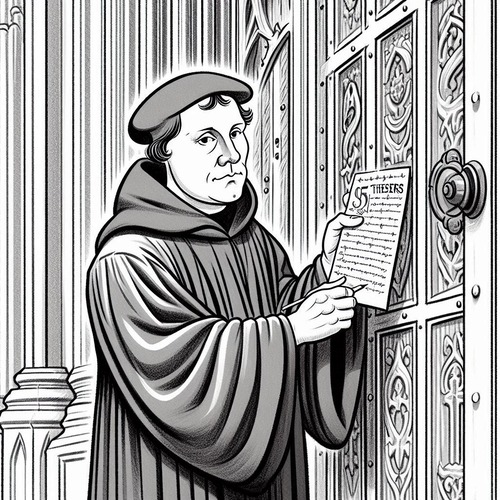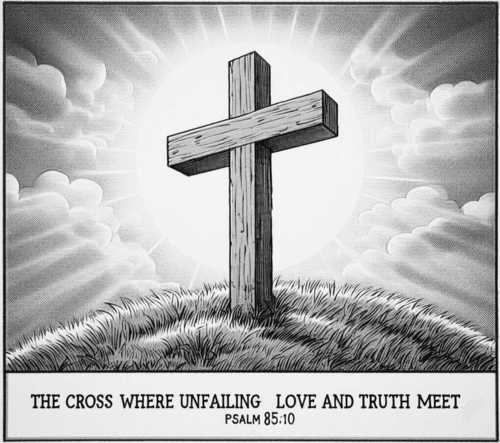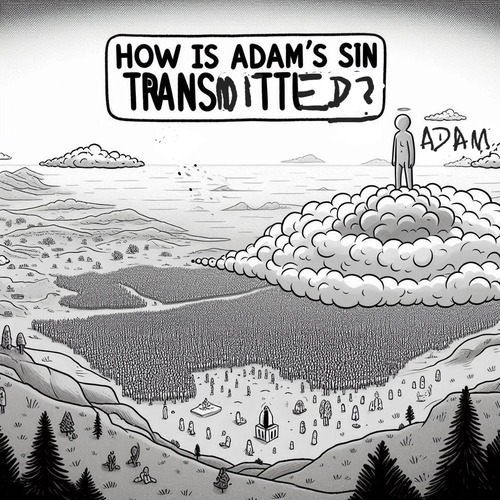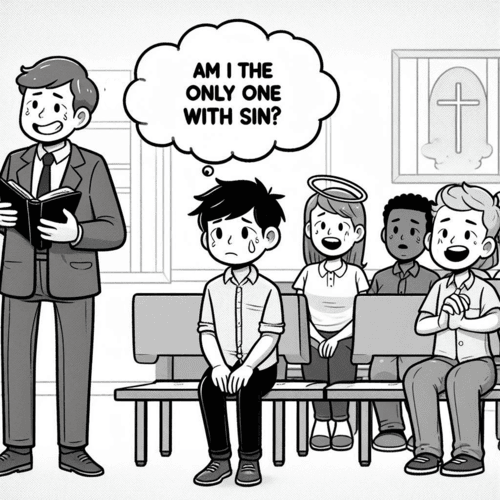The Reformation’s Five ‘Solas’: Cornerstones of Salvation
IMAGE CAPTION: When it all began: The glorious Reformation began with Martin Luther nailing his 95 Theses to a cathedral door in 1517
Reclaiming the Gospel
The Protestant Reformation’s Five ‘Solas’: The Reformation was a monumental movement that reshaped Western Christianity and sent ripples across the world. At its heart was a daring challenge to the flawed doctrines and authoritarian abuses of the Roman Catholic Church. Through their united efforts, the Reformers reclaimed the gospel’s pure, glorious doctrine of salvation by grace alone.
Led by stalwarts like Martin Luther and John Calvin, the Reformers with their rallying cry of “Sola Scriptura” (Scripture Alone) resounded the call to make the Bible the supreme authority for faith and practice in the church. No longer would human traditions and papal decrees usurp God’s inerrant, complete Word. While not explicitly formulated together during the Reformation, the Solas were later distilled from the Reformers’ collective teachings, reflecting the convictions of theologians like Huldrych Zwingli, Philip Melanchthon, John Knox, Thomas Cranmer and William Tyndale.
Crystallizing this biblical emphasis were the five Latin Solas (meaning “alone”)—rays emanating the guiding light of truth with pinpoint precision. These five Solas formed the bedrock truths recovering the apostolic gospel of salvation. Let us explore what they are and why they remain immensely vital:
Sola Scriptura (Scripture Alone)
With prophetic boldness, the Reformers rejected any authority being placed over or equated to the Bible. Scripture alone reigned as the inspired, sufficient and infallible source of God’s special revelation to humanity (2 Timothy 3:16-17). Not Scripture plus tradition or papal proclamations, but Scripture alone held the supreme, binding truth about salvation.
Sola Gratia (Grace Alone)
The Bible message rang out unequivocally—humanity is radically depraved, unable to earn favour with God through any works or merits of our own (Ephesians 2:8-9). Against the Catholic system of indulgences and obedience-based righteousness, rings out this message that fallen man can find salvation by God’s grace alone through His unmerited favour.
Sola Fide (Faith Alone)
How then do we receive this amazing grace? The Reformers upheld the biblical truth it is through faith alone in Christ’s finished work, not our feeble efforts (Romans 3:28). Real faith isn’t mere intellectual assent but a repentant, spiritual rebirth that leads to transformation (James 2:17). Yet even this faith isn’t our own doing but a gracious gift from God (Ephesians 2:8).
Solus Christus (Christ Alone)
At the blazing centre of this theological reinvigoration was the supreme truth that salvation is found in Christ alone as the singular Mediator between God and man (1 Timothy 2:5). His death alone pleases the Father and propitiates for sins. No human priests, saints or Mary can offer salvific mediation. Christ alone is the Way, Truth and Life (John 14:6).
Soli Deo Gloria (Glory to God Alone)
Ultimately, God alone deserves all glory for the wondrous drama and work of redemption. From predestination to justification to sanctification to glorification, it’s all about magnifying His infinite majesty, wisdom, grace and power in radically restoring fallen humanity (Romans 11:36). Salvation exalts and elevates God alone as the Creator, Sustainer and Redeemer.
The Reformation’s Five ‘Solas’ weren’t just catchy phrases. They were powerful truths that stripped away years of man-made rules in the church.
Today, these principles still matter. They remind us that salvation comes from God’s kindness through Jesus. Our job is to trust Him, follow the Bible, and live for God’s glory.
If you feel weighed down by religious rules or traditions, let the Reformation’s Five ‘Solas’ light your way. They show us that salvation is God’s amazing gift from start to finish!
In a world where it’s easy to lose sight of what’s important, the Reformation’s Five ‘Solas’ keep us focused on the heart of the Christian faith. They’re like five bright flames, keeping the true message of the gospel burning strong.
Editor's Pick

Does Ocean Salt Content Prove a Young Earth?
A COMPELLING LOOK AT MARINE CHEMISTRY AND EARTH’S TIMELINE The Salt Question That Challenges Deep Time: If Earth’s oceans have [...]
Noah’s Flood: Where Did All the Water Come From? And Go?
The question hits every Bible-believing Christian at some point: “If Noah’s flood covered the whole earth, where did all that [...]

No Marriage in Heaven? What Does Mark 12:25 Mean?
“Will I see my spouse in heaven? Will we still be married?” These questions pierce the heart of every Christian [...]
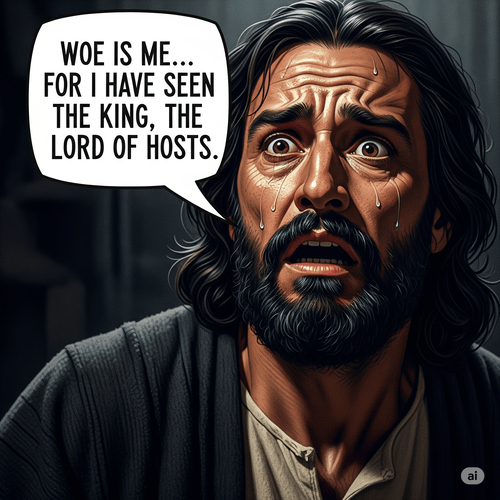
The Terror of Meeting God: What Isaiah 6 Reveals About Divine Holiness
WHEN ‘WOE IS ME’ IS THE ONLY PROPER RESPONSE TO A GLIMPSE OF GOD Picture this: You’re a prophet of [...]

Is the Holy Spirit Present in Unbelievers? The Biblical Answer
Can someone who doesn’t believe in Jesus Christ have the Holy Spirit living inside them? This question strikes at the [...]

The Gap Theory Exposed: Why Embrace a Young Earth?
The Gap Theory proposes there’s a vast time gap—millions or billions of years—between Genesis 1:1 (“In the beginning God created [...]

Rethinking Sickle Cell Anaemia: A Case for Intelligent Design
Sickle cell anaemia presents what many consider evolution’s strongest card—a genetic condition that causes suffering yet provides protection against malaria. [...]

‘Bad’ Design: Flaw in Nature Or Flaw in Our Perspective?
When the Eiffel Tower was first proposed, critics called it a monstrous eyesore that would ruin Paris forever. Today, it’s [...]

The Problem of Divine Absence: How Do Believers Cope?
WHEN GOD SEEMS FAR: THE GREAT DISCONNECT Ever wondered why God seemed so close to Joseph in his Egyptian prison, [...]

Is ‘Gay Christian’ a Biblically Acceptable Identity to Have?
THE QUESTION OF IDENTITY IN BIBLICAL PERSPECTIVE The term “gay Christian” has become increasingly common in contemporary religious discourse, representing [...]
SUPPORT US:
Feel the Holy Spirit's gentle nudge to partner with us?
Donate Online:
Account Name: TRUTHS TO DIE FOR FOUNDATION
Account Number: 10243565459
Bank IFSC: IDFB0043391
Bank Name: IDFC FIRST BANK


